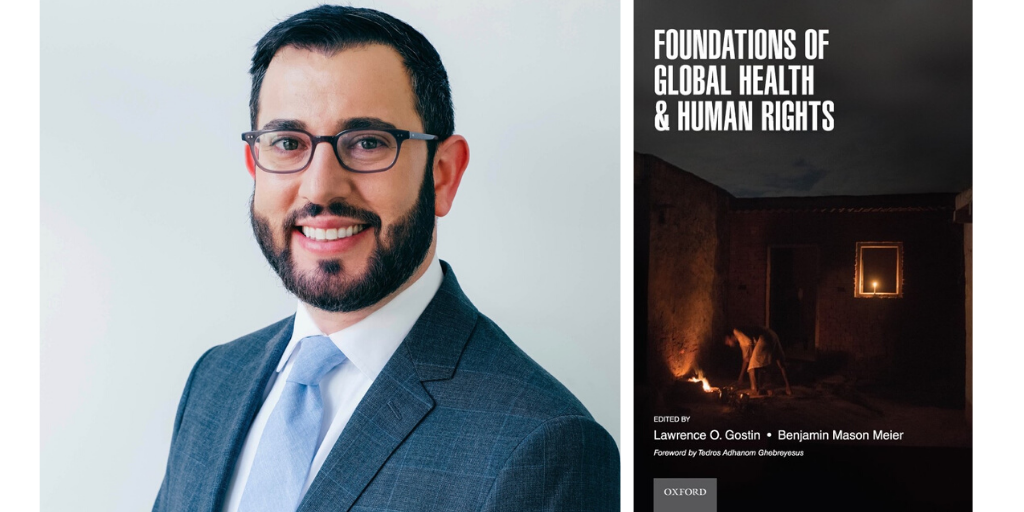
 Bookmark This is a feature that highlights new books by College of Arts & Sciences faculty and alumni, published the first week of each month.
Bookmark This is a feature that highlights new books by College of Arts & Sciences faculty and alumni, published the first week of each month.
Featured book: Foundations of Global Health and Human Rights (Oxford University Press, July 2020) by Benjamin Mason Meier and Lawrence O. Gostin.
Q: Can you give us a brief synopsis of your book?
A: Human rights promotion is essential for global health advancement. Establishing government obligations under international law, international human rights law upholds our disease prevention and health promotion efforts — realizing the highest attainable standard of health. Foundations of Global Health & Human Rights systematically examines the impact of human rights across public health challenges.
Professor Lawrence Gostin and I developed this foundational text to apply fundamental human rights to leading public health threats and analyze human rights challenges in a rapidly globalizing world. As policymakers continue to falter in the pandemic response, as they push away the unimaginable, our textbook clarifies how interdisciplinary scholarship will be crucial to securing a future of global health with justice.
Q: How does this fit in with your research interests and passions?
A: This textbook developed from our 2018 book, Human Rights in Global Health: Rights-Based Governance in a Globalizing World, which compared human rights advancement across the United Nations. Through our policy analysis, it became clear that there was no educational resource to support health-related human rights. Although the language of “human rights” is central to public health, professionals must be able to apply the obligations of human rights in health policy.
Rising threats in an increasingly divided world are challenging the future of human rights in global health. In supporting the next generation to meet these threats, our textbook provides a detailed understanding of the evolving relationship between health and human rights, giving students the human rights tools to promote transformative health policies. We developed this book for our students. They are our legacy.
Q: What was the original idea that made you think: “There’s a book here?”
A: In preparing future leaders to rise up in the face of mounting challenges, human rights education will be crucial to the future of global health. The field of Health & Human Rights has developed to advance human rights in public health, but it never before had a textbook to support teaching. If we lay a strong enough foundation, this textbook can challenge students and empower professionals to implement human rights in health policy.
The collective knowledge of our contributors comes together in this book to elucidate the development, implementation and application of human rights in global health. While this volume draws on their combined expertise, we worked non-stop to write the chapters into a single narrative, with each chapter building on the one before it while adding new information to a student’s understanding of the field – explaining the struggles of the past to prepare for the future.
Q: What surprised you when researching/writing this book?
A: As we reached the final page proofs for this necessary book, the world turned upside down, with a pandemic exposing the fragility of our globalized world and laying bare our human rights failures. The book launch was postponed to allow me to revise the text comprehensively to address this transformed global health landscape. Yet, as human rights movements responded to the injustices of systemic racism and a cataclysmic pandemic, this book became more necessary than ever before.
Human rights must frame public health prevention, healthcare services and global solidarity in the COVID-19 response. But this is not a moment — it’s the movement. In supporting the struggle to uphold human rights in global health in these unprecedented times, I hope that this academic foundation for the field will continue to prove essential for students to become human rights advocates, advancing health with justice throughout their careers. That would be enough.
Q: Where’s your go-to writing spot, and how do you deal with writer’s block?
A: This book was developed in two years — from outline to publication — and over that time and throughout this pandemic, my laptop has never been out of reach. Whether I am teaching in Chapel Hill or working in New York, I am writing, day and night, like I’m running out of time. In those moments when it felt overwhelming, my students were there to pull me back.
While grateful for the intellectual contributions of our groundbreaking contributors, this book came to publication through our dedicated team of research assistants at UNC. Meeting with me each week over the past year — in-person then online — these inspiring Carolina students and alumni persevered through the pandemic to provide a foundation for the future — their future.
Finding hope in our students, we end the book by focusing on resilience, with our afterword speaking directly to the students studying the field in these difficult days. As they write their way out, I hope that we have provided them with the tools to support their resilience and the strength to keep pushing ahead.
Meier is associate professor of public policy. His interdisciplinary research — at the intersection of international law, public policy and global health — examines human rights frameworks for global health governance.
Nominate a book we should feature (published in about the last six months) by emailing college-news@unc.edu. Find some great books to add to your reading list by checking out our College books page.
